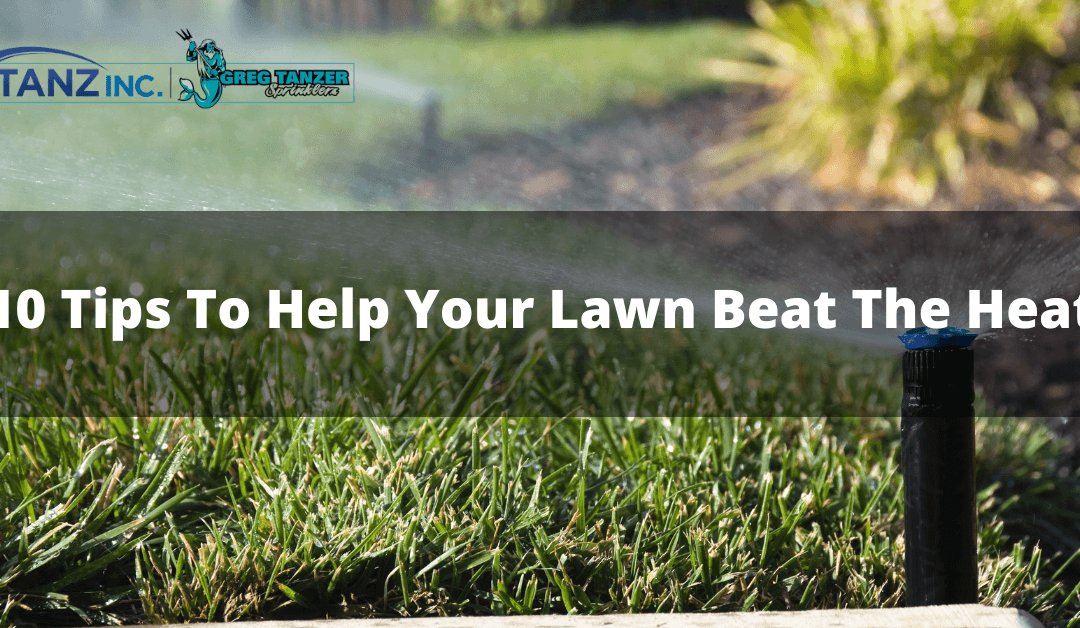This summer has been brutal in New Jersey. July was one of the warmest with an average temp of 78.1˚and the average rainfall was 2.52” below normal. High temperatures and reduced precipitation are an awful combination for a healthy lawn.
Unfortunately, incorrectly caring for your lawn during extreme heat can cause your lawn to become stressed and creates an opportunity for pests and diseases to invade.
Remember these tips while caring for your lawn during high temperatures and minimal rainfall.
Water Early in The Morning
Water your grass during the cooler part of the day. Watering before the temperatures climb minimizes evaporation and allows the water to go deeper to the roots. If you water your lawn during the heat of the day, you will not achieve a deep root watering of 6-8 inches below the surface. Watering your lawn in the evening with no sunlight lets moisture build-up and creates an opportunity for molds and fungi to take root and spread throughout your lawn.
Do Not Overwater
Overwatering is one of the most common mistakes we see during extreme heat and reduced rainfall. Logic tells us that we should water our lawns more frequently if we aren’t getting rain. Unfortunately, that is not the case with turfgrasses. Turfgrasses grow better when the grass is dry, but the root system gets approximately 1 inch of water from rainfall or weekly water.
Sharpen Your Mower Blades
Your lawn heals much quicker when it’s cut with sharp mower blades. Mowing the lawn with dull blades tears the plant tissue instead of cutting it. The tearing causes stress and damage to your grass. A damaged and stressed yard is more susceptible to disease.
Minimizing Mowing
During a drought, your lawn struggles to recover after mowing. For the best results, do not cut your lawn too short. A good guideline is to avoid cutting more than one-third of the overall grass height. When you need to mow during hot, dry weather, mow after a rainfall or watering day.
Do Not Bag Grass Clippings
Since you won’t cut your lawn much during the heat, don’t bag the grass clippings. Clippings are beneficial to the yard. They form helpful moisture-retaining mulch and act as a slow-release fertilizer for your lawn as they decompose.
Avoid Fertilizing
Fertilizing your lawn stimulates growth, and grass requires more water and nutrient to thrive after fertilization. So, fertilizing during high temperatures means your yard consumes more energy than it produces, and fertilization during hot spells will stress your lawn.
Pull The Weeds
Unlike your grass, weeds love a heat wave. While your lawn is struggling, weeds will thrive in your garden and lawns. To prevent a full-blown weed take over, hand pull the weeds during the warmer temperatures.
Aerate Warm Weather Grasses
If your soil is hard and water is running off of your lawn rather than absorbing into the ground, give your yard a light aeration. This will allow water, air, and other nutrients to penetrate the soil and reach the roots of the grass. Deep watering is crucial in warmer weather.
Have A Year-Round Health Plan
A year-round health plan for your lawn will help support a healthy yard throughout the year. A healthy lawn tolerates heat better. It’s essential to have a comprehensive lawn care plan that includes proper fertilization, watering, mowing, and pest control. A year-round health plan for your yard produces a consistently healthy lawn.
Call A Professional
Ensure your system’s performance, effectiveness, and longevity with our sprinkler system repair and maintenance service contract. We can activate your sprinkler system, winterize it, repair, replace or redesign it.
We’ve been providing New Jersey residents with our trusted and expert service since 1982, earning us the title of New Jersey’s “Irrigation King.” Contact Greg Tanzer Sprinkler today for a free irrigation system estimate.

